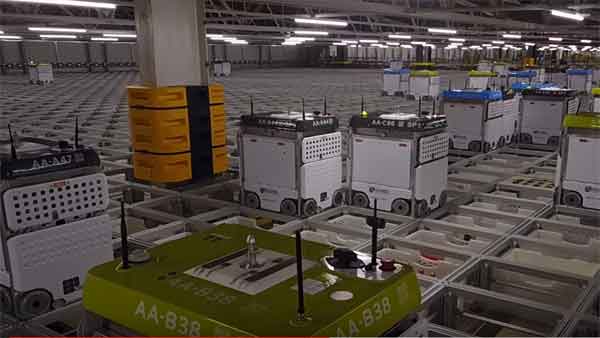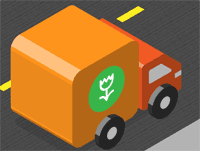| |
|
| |
|
 |
Supply
Chain by the Numbers |
| |
|
| |
- Nov. 1, 2018 -
|
| |
|
| |
|
| |
|
| |
Kroger to Commit to Robotic DCs; Sealed Air Promises All Green Packaging; US Manufacturing Growth Slows but Still Strong; Big Bucks Going to Fund Last Mile Delivery Companies |
| |
|
| |
| |
| |
| |
20 |
 |
That is how many how many high tech, robotic distribution centers from a UK company called Ocado that grocery chain Kroger is expected to construct over the next few years. That will start with an order for three automated DCs by the end of the year, according to a report from Reuters this week. Kroger first announced the partnership with Ocado in May. Ocado is actually an on-line grocer that developed this automated system for its own facilities before marketing it to other grocers. The Kroger deal is Ocado's biggest yet, exceeding all of the warehouses the firm has built or plans to build with Morrisons in Britain, Casino in France, Sobeys in Canada and ICA Group in Sweden. In fact, Ocado will not only develop but also operate those sites in the US. Ocado said the terms and fee structure of the Kroger deal are similar to those for its other transactions to-date, combining up-front fees and ongoing capacity fees.
|
|
|
| |
| |
|
|
|
That was the level of the October Purchasing Managers Index, as released Thursday from the Institute for Supply Management. That was down from 59.8 in September and a scorching 61.3 in August, consistent with other indicators that US economic growth is slowing a bit. But at 57.7, the index is still well above the 50 mark that separates manufacturing expansion from contraction, and marks the 26th straight month the index has been positive. The New Orders Index was also down, falling 4.4 percentage points to 57.4. While still showing growth in new orders, that index was below the 60 mark for the first time since April 2017. Meanwhile, commodity and input costs continue to rise, with the Prices Index registered 71.6, a 4.7-percentage point increase from the September reading of 66.9, indicating higher raw materials prices for the 32nd consecutive month, with prices accelerating month over month.
|
| |
| |
|
| |
| |
| |
$500 Million |
 |
That is the current valuation of ecommerce delivery firm Deliv, after it received another $40 million in funding this week. Rival Instacart amazingly raised $600 million in funding earlier this month. Target last year bought Shipt, a grocery delivery startup similar to Instacart, for $550 million. New investors in the latest Deliv funding include Alphabet Inc.'s Google and rental-car firm Enterprise Holdings, Deliv said. Previously Deliv raised over $40 million from investors including mall owner GGP Inc. and UPS. Deliv has carved out a niche in the competitive landscape by not emphasizing its brand with shoppers, instead working behind the scenes to provide logistics software along with a crowdsourced fleet of drivers to make deliveries. Scale is what is attractive to customers such as Walmart – Deliv already operates in some 1400 metro markets. Walmart, the country's largest grocer, plans to offer same-day grocery delivery in 100 metro areas by the end of the year, using crowdsourced delivery companies including Deliv, Postmates and DoorDash. Walmart is also testing its own crowdsourced system called Spark Delivery, in part because delivery companies aren't yet available to service the thousands of stores Walmart has in small towns and rural areas. |
| |
| |
| |
|
|
|
| |
 |
 |
| |
|
|
| |